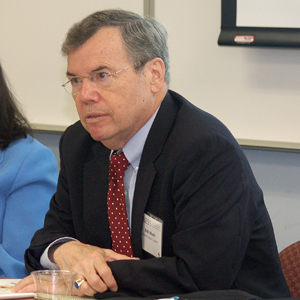
Bob Musil (Courtesy of the Rachel Carson Council)
Bob Musil has gone from being raised in Garden City to becoming a leader of the environmental and peace movements in the United States, a major figure in the challenges to nuclear war and nuclear power.
Musil has been president and CEO of the Rachel Carson Council since 2014. The council, as it declares on its website, “builds on the work, legacy, and environmental ethic of Rachel Carson. We link environmental, health and social issues, as Rachel Carson did, into a single, unified approach to today’s critical sustainability issues. We combine powerful and credible science and health research with a sense of wonder, awe, imagination, creativity and feeling for the beauty and bounty of the world that surrounds us and of which we are a part.”
And, “We connect concern for the natural world with the health and well-being of our fellow humans and their communities. We engage citizens from all walks of life to expand a growing movement beyond traditional environmentalists and conservationists. We include those who have been excluded and are most vulnerable to environmental dangers—as well as those already in a position to create more sustainable, equitable policies, businesses, and institutions.”
Musil, who has a Ph.D. and also a Master of Public Health, was before becoming head of the Rachel Carson Council, a nationwide membership organization, executive director and CEO of Physicians for Social Responsibility, winner of the 1985 Nobel Peace Prize.
Before that he was executive director of the Professionals’ Coalition for Nuclear Arms Control; the SANE Education Fund; and Center for National Security Studies Military Affairs Project.
He is also president of the organization Beyond Nuclear, which says on its website that it works for “a world free of nuclear weapons and nuclear power.”
The Rachel Carson Council is based in Bethesda, Maryland with an office in Washington, D.C. It is named for the woman who wrote the landmark 1962 book Silent Spring exposing the toxic impacts of pesticides, especially DDT.
It was established in 1965, a year after she died, “to carry on her work,” explained Musil in an interview. He notes that in addition to Carson’s focus on pesticides, she took on other issues including climate change, factory farming and nuclear weapons testing. Likewise, the Rachel Carson Council is “proud to carry on” her multiple challenges and her “commitment to advocacy and action.”
From Garden City, Musil went to Yale University at 16. The Vietnam War was a critical turning point. He had joined the ROTC at Yale and became a captain in the U.S. Army. But he refused to participate in the Vietnam War. He applied for conscientious objector status and was honorably discharged from the Army.
He is author of the books Hope for a Heated Planet: How Americans are Fighting Global Warming and Building a Better Future; Rachel Carson and Her Sisters: Extraordinary Women Who Have Shaped America’s Environment; and Washington in Spring: A Nature Journal for a Changing Planet.
He is an educator, too, senior fellow and adjunct professor at the Center for Congressional and Presidential Studies at the School of Public Affairs at American University.
He is a graduate not only of Yale but of Northwestern University, where he received his Ph.D., and the Johns Hopkins School of Public Health, where he was awarded his M.P.H.
The council tries “to bring the power of grassroots inside the halls of power,” Musil says.
Its current campaigns as noted on its website on a page headed “Get Involved” includes “Tell your Senators and Representative to Co-Sponsor the Polluters Pay Climate Fund Act of 2024! This groundbreaking legislation would hold the biggest, most historically polluting fossil fuel corporations accountable for knowingly contributing to and exacerbating climate change through their exorbitant greenhouse gas emissions.”
And, “Keep Pesticides Out of Our Communities! Protecting the public from harmful pesticides has been a core component of the Rachel Carson Council’s mission since the organization’s founding…Decades later, the pesticide manufacturing industry continues to produce toxic chemicals and seek immunity from regulations that would protect agricultural workers, consumers, children, and communities.”
And, “Tell Congress to Stop Styrofoam! Good news! Legislators are taking your concerns about Big Plastic’s continued disregard for environmental and public health seriously.” The “Farewell to Foam Act would ban all single-use expanded polystyrene products, including foodware, by January 2026!”
And “Justice for Victims of Formosa Plastics….Formosa Plastics is at it again. The petrochemical behemoth has once again targeted the St. James Parish in Louisiana to build a multibillion-dollar plastics plant. The St. James Parish, located in the heart of Cancer Alley, has already once defeated Formosa Plastics from further overburdening their community. Let’s help them do it again.”
The list — and actions of the Rachel Carson Council — goes on.

